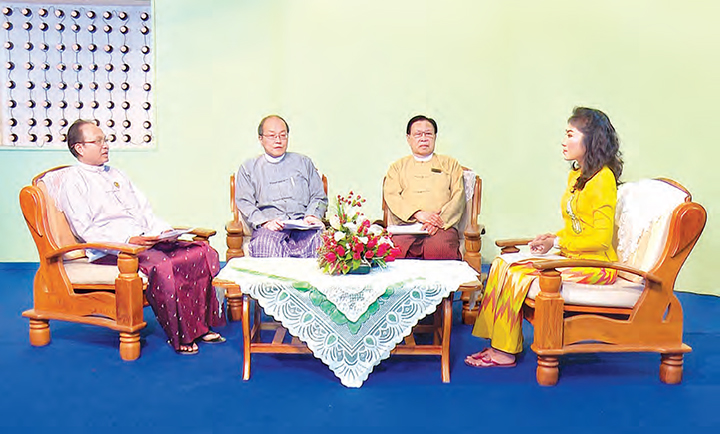3 March
The following is an education roundtable on upgrading and potentially renovating Yangon University, broadcasted on MRTV. The participants include Dr. Maung Maung Wint, Chairman of the Software Committee and former Director-General of the Medical Science Department under the Ministry of Health and Sports, Dr. Poe Kaung, Rector of Yangon University, and Dr. Aung Min, Vice Chairman of tbe Myanmar Academy of Arts and Science.
Facilitator: Dr. Maung Maung Wint, could you first tell us how the upgrading project was conceived and what processes are included in it?
Dr. Maung Maung Wint: For a time, Yangon University was a prominent academia renowned for its quality of education and standards throughout Southeast Asia since its establishment in 1920.
And now, to meet the educational needs and socioeconomic requirements of modern society, a motion was put forward during the First Pyithu Hluttaw by then MP Daw Aung San Suu Kyi, to renovate the university and facilitate better cooperation with regional and international learning institutions. The Hluttaw apporved the motion after a majority voted in favour.
Drafting a Master Plan
Now, this was a national level task which required a sound Master Plan to guide it through. We formed think tanks and committees as necessary and began a draft in 2017. The Steering Committee for this undertaking is chaired by the Union Minister for Education and includes domestic and foreign experts. We have onboard Professor Matei amd Sasha from the Hungarian Central European University, the Irrawaddy Policy Exchange, and UK-based Kilburn Nightingale Construction.
As for local experts, we have individuals with a strong background in education, two MPs from Hluttaw Education Committees, and senior officials from MoE in the relevant committees. We have working committees, a Hardware Committee, Master Plan Drafting Committee, and a University Charter Committee, all working togehter to accomplish this grand project.
“Yangon University is a historic institution and while we are maintaining it as a historical heritage, we are simultaneously working towards transforming it into a clean, picturesque and vibrant learning environment befitting international standards.”
Dr. Poe Kaung, Rector of Yangon University
Facilitator: Could you elaborate on some of the major components of the Master Plan?
Dr. Maung Maung Tint: The first thing is that the upgraded university will vary greatly from the preexisting one. We will have to refine and reform the administration, management systems, the setup, organizations and policies of the university. The discussions for that are ongoing.
The second component is fulfilling the requirements of an autonomous university, which YU falls under in accordance with the National Education Law 2015.
The third compoment is managing educational changes, establishing faculty systems, and departments for major subjects. We also have to plan expanding existing departments to accomodate the new centres we will build for them. Another thing to consider is reassessing our existing curriculum to make necessary reviews, revisions, or drafting mew ones.
Changes are necessary
The curriculum policies must also be amended to suit the quality of education, develop the national socioeconomics, and ensure smoother student mobility.
Another major component of any university is setting up an internal quality assurance system, which YU sorely needs and is working with topmost priority. We will also increase applied research activities for the students.
We’re looking to implement collaboration programmes with external universities, namely Yangon University of Foreign Languages, Yangon University of Education, Yangon University of Economics, Yangon Technological University, and the Information and Technology University. Thus, we will be pooling our resources, sharing resources and academic activities, research activities, and training activities.
The library will also be upgraded
The YU’s library will also be developed into an e-Library to match the needs of the modern era. The Open Society Foundation, Central European University, and Kyoto University are providing invaluable support in this regard.
Another important component is proliferating English proficiency. All of the aforementioned tasks and collaborations will require a certain mastery of the English language to achieve substantial results.
Facilitator: Could you explain the physical infrastructure and hardware aspects of the project, Dr. Poe Kaung?
Dr. Poe Kaung: The Master Plan is divided into two distinct categories, which are upgrading the education software, and renovating the infrastructure and hardware. Upgrading the education system relies on having the necessary infrastructure and hardware to accommodate them.
Yangon University is a historic institution and while we are maintaining it as a historical heritage, we are simultaneously working towards transforming it into a clean, picturesque and vibrant learning environment befitting of international standards.
Facilitator: Could you continue to elaborate on the important sectors for upgrading the university?
Dr. Poe Kaung: The existing organizational structure and policies of the university need to be reassessed for its ingrained advantages to reform the university’s education, administration and management systems so that our Yangon University will be organized as an autonomous university as prescribed in the National Education Law.
(To be continued)
(Translated by Pen Dali)
By News Team


